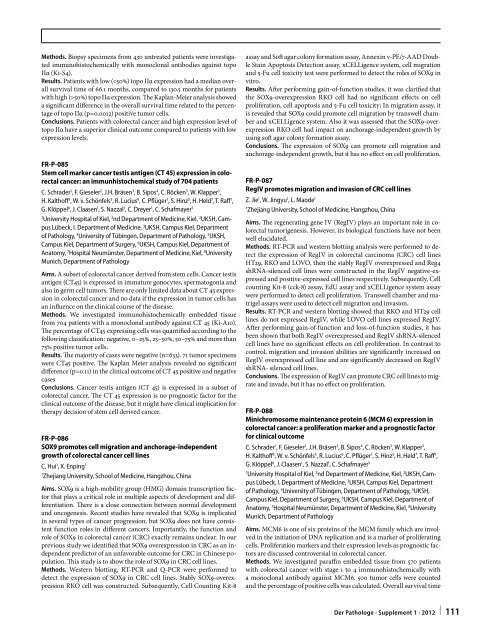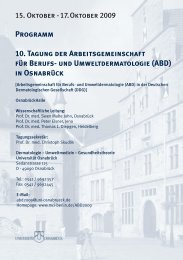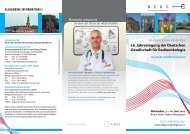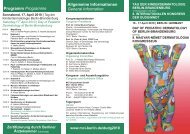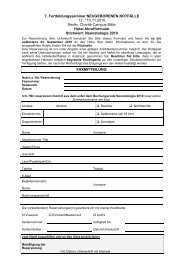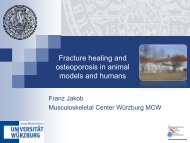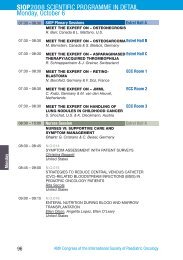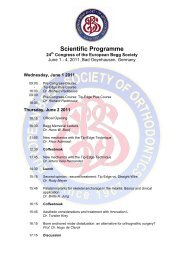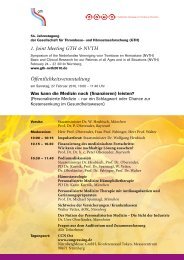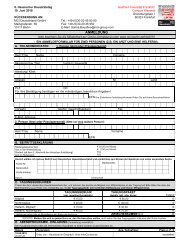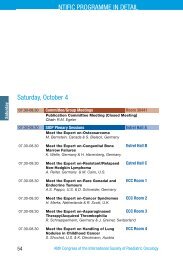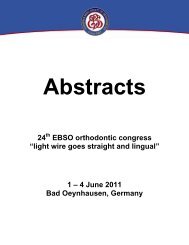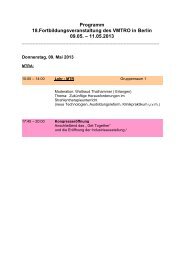96. Jahrestagung der Deutschen Gesellschaft für Pathologie e. V ...
96. Jahrestagung der Deutschen Gesellschaft für Pathologie e. V ...
96. Jahrestagung der Deutschen Gesellschaft für Pathologie e. V ...
Create successful ePaper yourself
Turn your PDF publications into a flip-book with our unique Google optimized e-Paper software.
Methods. Biopsy specimens from 430 untreated patients were investigated<br />
immunohistochemically with monoclonal antibodies against topo<br />
IIα (Ki-S4).<br />
Results. Patients with low (50%) topo IIα expression. The Kaplan-Meier analysis showed<br />
a significant difference in the overall survival time related to the percentage<br />
of topo IIα (p=0.0012) positive tumor cells.<br />
Conclusions. Patients with colorectal cancer and high expression level of<br />
topo IIα have a superior clinical outcome compared to patients with low<br />
expression levels.<br />
FR-P-085<br />
Stem cell marker cancer testis antigen (CT 45) expression in colorectal<br />
cancer: an immunhistochemical study of 704 patients<br />
C . Schra<strong>der</strong>1 , F . Gieseler2 , J .H . Bräsen3 , B . Sipos4 , C . Röcken3 , W . Klapper3 ,<br />
H . Kalthoff5 , W . v . Schönfels5 , R . Lucius6 , C . Pflüger1 , S . Hinz5 , H . Held7 , T . Raff1 ,<br />
G . Klöppel8 , J . Claasen1 , S . Nazzal1 , C . Dreyer1 , C . Schafmayer5 1 2 2 University Hospital of Kiel, nd Department of Medicine, Kiel, UKSH, Campus<br />
Lübeck, I . Department of Medicine, 3UKSH, Campus Kiel, Department<br />
of Pathology, 4University of Tübingen, Department of Pathology, 5UKSH, Campus Kiel, Department of Surgery, 6UKSH, Campus Kiel, Department of<br />
Anatomy, 7Hospital Neumünster, Department of Medicine, Kiel, 8University Munich, Department of Pathology<br />
Aims. A subset of colorectal cancer <strong>der</strong>ived from stem cells. Cancer testis<br />
antigen (CT45) is expressed in immature gonocytes, spermatogonia and<br />
also in germ cell tumors. There are only limited data about CT 45 expression<br />
in colorectal cancer and no data if the expression in tumor cells has<br />
an influence on the clinical course of the disease.<br />
Methods. We investigated immunohistochemically embedded tissue<br />
from 704 patients with a monoclonal antibody against CT 45 (Ki-A10).<br />
The percentage of CT45 expressing cells was quantified according to the<br />
following classification: negative, 0–25%, 25–50%, 50–75% and more than<br />
75% positive tumor cells.<br />
Results. The majority of cases were negative (n=633). 71 tumor specimens<br />
were CT45 positive. The Kaplan Meier analysis revealed no significant<br />
difference (p=0.11) in the clinical outcome of CT 45 positive and negative<br />
cases<br />
Conclusions. Cancer testis antigen (CT 45) is expressed in a subset of<br />
colorectal cancer. The CT 45 expression is no prognostic factor for the<br />
clinical outcome of the disease, but it might have clinical implication for<br />
therapy decision of stem cell <strong>der</strong>ived cancer.<br />
FR-P-086<br />
SOX9 promotes cell migration and anchorage-independent<br />
growth of colorectal cancer cell lines<br />
C . Hui1 , X . Enping1 1Zhejiang University, School of Medicine, Hangzhou, China<br />
Aims. SOX9 is a high-mobility group (HMG) domain transcription factor<br />
that plays a critical role in multiple aspects of development and differentiation.<br />
There is a close connection between normal development<br />
and oncogenesis. Recent studies have revealed that SOX9 is implicated<br />
in several types of cancer progression, but SOX9 does not have consistent<br />
function roles in different cancers. Importantly, the function and<br />
role of SOX9 in colorectal cancer (CRC) exactly remains unclear. In our<br />
previous study we identified that SOX9 overexpression in CRC as an independent<br />
predictor of an unfavorable outcome for CRC in Chinese population.<br />
This study is to show the role of SOX9 in CRC cell lines.<br />
Methods. Western blotting, RT-PCR and Q-PCR were performed to<br />
detect the expression of SOX9 in CRC cell lines. Stably SOX9-overexpression<br />
RKO cell was constructed. Subsequently, Cell Counting Kit-8<br />
assay and Soft agar colony formation assay, Annexin v-PE/7-AAD Double<br />
Stain Apoptosis Detection assay, xCELLigence system, cell migration<br />
and 5-Fu cell toxicity test were performed to detect the roles of SOX9 in<br />
vitro.<br />
Results. After performing gain-of-function studies, it was clarified that<br />
the SOX9-overexpression RKO cell had no significant effects on cell<br />
proliferation, cell apoptosis and 5-Fu cell toxicity; In migration assay, it<br />
is revealed that SOX9 could promote cell migration by transwell chamber<br />
and xCELLigence system. Also it was assessed that the SOX9-overexpression<br />
RKO cell had impact on anchorage-independent growth by<br />
using soft agar colony formation assay.<br />
Conclusions. The expression of SOX9 can promote cell migration and<br />
anchorage-independent growth, but it has no effect on cell proliferation.<br />
FR-P-087<br />
RegIV promotes migration and invasion of CRC cell lines<br />
Z . Jie1 , W . Jingyu1 , L . Maode1 1Zhejiang University, School of Medicine, Hangzhou, China<br />
Aims. The regenerating gene IV (RegIV) plays an important role in colorectal<br />
tumorigenesis. However, its biological functions have not been<br />
well elucidated.<br />
Methods. RT-PCR and western blotting analysis were performed to detect<br />
the expression of RegIV in colorectal carcinoma (CRC) cell lines<br />
HT29, RKO and LOVO, then the stably RegIV overexpressed and Reg4<br />
shRNA-silenced cell lines were constructed in the RegIV negative-expressed<br />
and positive-expressed cell lines respectively. Subsequently, Cell<br />
counting Kit-8 (cck-8) assay, EdU assay and xCELLigence system assay<br />
were performed to detect cell proliferation. Transwell chamber and matrigel<br />
assays were used to detect cell migration and invasion.<br />
Results. RT-PCR and western blotting showed that RKO and HT29 cell<br />
lines do not expressed RegIV, while LOVO cell lines expressed RegIV.<br />
After performing gain-of-function and loss-of-function studies, it has<br />
been shown that both RegIV overexpressed and RegIV shRNA-silenced<br />
cell lines have no significant effects on cell proliferation. In contrast to<br />
control, migration and invasion abilities are significantly increased on<br />
RegIV overexpressed cell line and are significantly decreased on RegIV<br />
shRNA- silenced cell lines.<br />
Conclusions. The expression of RegIV can promote CRC cell lines to migrate<br />
and invade, but it has no effect on proliferation.<br />
FR-P-088<br />
Minichromosome maintenance protein 6 (MCM 6) expression in<br />
colorectal cancer: a proliferation marker and a prognostic factor<br />
for clinical outcome<br />
C . Schra<strong>der</strong>1 , F . Gieseler2 , J .H . Bräsen3 , B . Sipos4 , C . Röcken3 , W . Klapper3 ,<br />
H . Kalthoff5 , W . v . Schönfels5 , R . Lucius6 , C . Pflüger1 , S . Hinz5 , H . Held7 , T . Raff1 ,<br />
G . Klöppel8 , J . Claasen1 , S . Nazzal1 , C . Schafmayer5 1 2 2 University Hospital of Kiel, nd Department of Medicine, Kiel, UKSH, Campus<br />
Lübeck, I . Department of Medicine, 3UKSH, Campus Kiel, Department<br />
of Pathology, 4University of Tübingen, Department of Pathology, 5UKSH, Campus Kiel, Department of Surgery, 6UKSH, Campus Kiel, Department of<br />
Anatomy, 7Hospital Neumünster, Department of Medicine, Kiel, 8University Munich, Department of Pathology<br />
Aims. MCM6 is one of six proteins of the MCM family which are involved<br />
in the initiation of DNA replication and is a marker of proliferating<br />
cells. Proliferation markers and their expression levels as prognostic factors<br />
are discussed controversial in colorectal cancer.<br />
Methods. We investigated paraffin embedded tissue from 570 patients<br />
with colorectal cancer with stage 1 to 4 immunohistochemically with<br />
a monoclonal antibody against MCM6. 500 tumor cells were counted<br />
and the percentage of positive cells was calculated. Overall survival time<br />
Der Pathologe · Supplement 1 · 2012 |<br />
111


